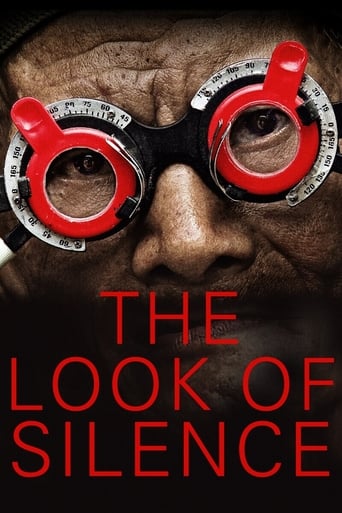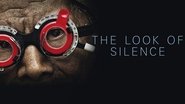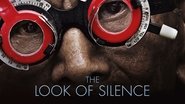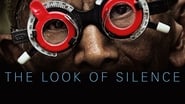evanston_dad
"The Act of Killing" is one of the best, weirdest, and most disturbing movies I've ever seen. Joshua Oppenheimer's follow up documentary, "The Look of Silence," is more conventional in its approach, but it's also deeply affecting.Oppenheimer returns to the same material he mined in "The Act of Killing," the slaughter of communists in Indonesia in the 1960s. The men who actually supervised the killings are alive and well for the most part, and still exercise a gangsterish kind of control over the country. Communists aren't still being murdered overtly and en masse, but one senses that it would be easy for someone to "disappear" if he/she pushed too hard against authority. "The Act of Killing" stuck close to the murderers, and we watched in stunned disbelief as they gleefully reenacted their killings, the heroes of their own demented movies. "The Look of Silence" follows a man whose brother was murdered as part of the Communist purges before he was even born, and now wants to confront the men who carried out the murder. It's unclear, probably even to himself, what he wants from these confrontations. Possibly just an apology, possibly simple recognition of what they did. The conversations run the gamut from cathartic to downright frightening (one man obliquely hints that he could make very bad things happen to the film's protagonist if he wanted to). But the reaction from all of the killers is essentially the same: the past is the past (even though in Indonesia it isn't), why are you bringing all of this up again, can't we just agree to forget?Of course agreeing to forget is what makes horrific events like these possible to repeat. The most fascinating interviews are those not with the killers themselves but with the children of the killers, the people who have inherited their parents' legacies (on both sides of the conflict) and now must make something of the world they share. In some cases, the children learn details they never before knew and we watch them process them on screen in real time. It's difficult as a viewer to know how to feel about these inheritors of their parents' actions. On the one hand, they really can't and shouldn't be held accountable for things their parents did when they were children or possibly not yet even born. On the other hand, like it or not, we all inherit our own histories and have to at least acknowledge them, both the good and the bad, if we are to learn from them.Both "The Look of Silence" and "The Act of Killing" are infuriating to Western viewers who have been raised to believe that freedom and justice eventually triumph and that evil, either individual or systemic, gets punished. These are brilliant films, and while they certainly sow doubts in my head about the state of mankind, I feel like a better person for having seen them.Grade: A+
Michael Radny
I didn't really know much about the mass killings in Indonesia in the 1960's before watching this documentary, but something about it was so compelling and unbelievable that it practically was a mini-ww2. The Indonesian government at the time were very much like Nazi's, which is sickening, and this documentary brings light about the disgraceful ways religious propaganda can persuade people to kill.What I got out of this documentary was that many of the killers didn't know what a communist was, let alone think they were people. They were spun lies about the communists and many took joy in killing them. One of the most eye opening documentaries I've seen, amongst one of the most sadistic and terrible mass killings in history.
MortalKombatFan1
"The Look of Silence" is a companion piece to Joshua Oppenheimer's previous film "The Act of Killing". Both films deal with the mass murder of communists in Indonesia between 1965 and 1966 - a serious crime resulting in the deaths of over a million innocent people by the hands of hired militia sanctioned by the government, but has gone unnoticed in the public eye for so long because the perpetrators are still at large, hailed as national heroes for stopping a revolution and in positions of power in government for over fifty years, living peacefully among the families of those they murdered."Act of Killing" is more audacious in style, following three killers as they recreate their murders for film in any genre they want (gangster flick, musical, etc.) - all the while they're boastful of their accomplishments, without any remorse or regret for their actions.'This film follows Adi Rukun, an optometrist who's brother was murdered in the genocide. We see him confronting death squad leaders and those who knew his brother, looking for some sort of understanding and possibly reconciliation for his murder. There are also domestic scenes with his mother and father, as well as with his wife and family. Life plays out happily before our eyes, but beneath it there are still painful reminders of the past when Adi talks about his brother with his mother, or when he tells his wife what he's been up to, talking with these killers they know. She says she would have stopped him if she knew, that his life could be in danger if he keeps digging up the past instead of forgetting. This gives the interviews a very real sense of tension, and you wonder if such a film could be made if it weren't for the involvement of outsiders who could be there with Adi.Still, Adi puts up a strong front, asking why they did what they did. The answer's usually the same, they deny individual responsibility, or say that it was necessary. Sometimes their answers are disturbing, saying that they drank the blood of their victims to stay sane. Family members of the now-deceased murderer of his brother deny knowing anything about their father's work. In a very affecting scene, Adi's uncle, a prison guard in the army says he was unaware what happened to the detained after they were shipped off onto trucks each day. He's trying to keep up a strong resolve, but you can see the pain in his face when he talks about the past.This film director chooses not to intrude on the telling of the stories with narration, but instead lets the interviewees tell their version of events, leaving pregnant pauses between answers to linger on their faces, which often tell more than spoken words ever could.It's a very quite, slow film, but I found it hypnotic and a damning portrait of a country's silence after horrendous acts were committed. Adi gives a voice to the families of many victims, and both films should be watched by everyone to get a better understanding of the depths humanity can sink to, and how a nation struggles to cope with long dormant pain after government sanctioned genocide.
Bryan Kluger
I didn't think it was possible to outdo one of the most compelling documentaries about the atrocious Indonesian killings during the mid 60s, but never say never. Joshua Oppenheimer set out over the last decade or so to confront and interview the mass murderers and victims of the Indonesian killings. Oppenheimer got Errol Morris and Werner Herzog on board to to produce his documentary, which was called 'The Act of Killing'.'The Act of Killing' followed a few of these mass murderers who killed literally thousands of innocent people over the span of a year or two. These people were men, women, and children who were thought to be communists. These victims weren't just shot in the head, but they were sadistically tortured and killed by a variety of ways. These murderers are still alive today and are considered heroes by the government, but are still feared by the common folk. It truly is unbelievable that the Indonesian government and paramilitary are still alive and well today, and are still in power, where these murderers walk free with no remorse.'The Act of Killing' earned an Oscar nomination for Best Documentary. Needless to say, this documentary didn't shed any good light on the Indonesian government nor the military, but Oppenheimer went back to make a follow up documentary, because his story is far from being over, which brings us to 'The Look of Silence'. This documentary is just as good if not better than 'The Act of Killing' and will draw tears and actually keep you on the edge of your seat for fear of Oppenheimer's life and his subject.'The Look of Silence' follows a single family, living in a small village in the heart of where the genocide of the 60s took place. The youngest son named Adi, who wasn't born at the time, now has a family and helps people with their eye glass prescriptions. Adi sets out to confront the mass murderers who tortured and killed his older brother Ramli. His bottomless devotion doesn't stop at confronting these people, but goes further into trying to get everyone in his country to seek the truth and start admitting what actually happened, because as we saw in 'The Act of Killing', the people in power will never admit to anything. It brings tears to my eyes as Adi uses his very calm demeanor, holding back his own tears and big gulps of breath as he tries to get answers and the killers to admit what they had done.Throughout the film, Adi confronts the killers who were concomitantly involved with his brother's death, then later in the film, he talks with the murderers who actually killed him. Each interview is more suspenseful than the one before it, as these people who are still in power are not too happy to be answering questions about this, which none of them actually want to come to terms with what they did. In fact, they still revel in the fact that they committed all these heinous crimes and consider themselves good people. It's all so heartbreaking as Adi begins to put the pieces together of his brother's death and who actually was involved, which hits closer to home than any of us would like to see.Adi is a simple man, but he is one of strong conviction to seek the truth without being a jerk. He is calm, collected, and always wise with his words and actions. He's a deeply exceptional person, and you can't help by connect with him on this very emotional journey. Oppenheimer is always by his side and with his camera, as he takes in the beautiful landscapes of Indonesia with his artistic eye. Almost every scene is a beautiful painting with so much pain behind it. I have no doubt that 'The Look of Silence' will win more awards this year, and this continues to show us the Joshua Oppenheimer is one of the best documentary filmmakers working today.






